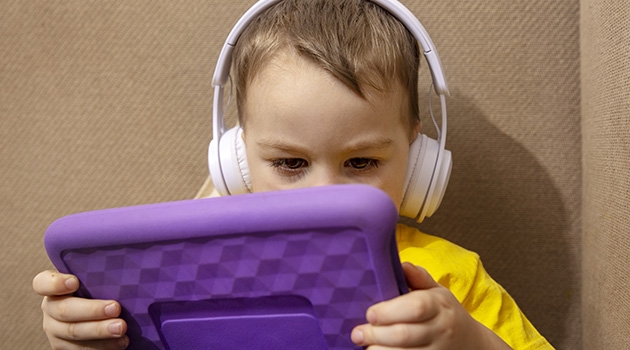Tablet computers make preschool children’s play less creative
Preschool children's play involving tablets is less creative and imaginative compared to their play involving physical toys. This is shown in a new study by Uppsala University, and the difference is substantial. The results counter occasional claims that new technology would make children more creative.
“Although the study is quite small, it shows that we should perhaps be careful about using touch screens with preschool children,” notes Robin Samuelsson at the Department of Scandinavian Languages at Uppsala University.
In a collaboration between researchers at Uppsala University and the Institute of Education at University College London in the UK, almost one hundred play activities were compared in two groups of preschool children, 2-year-olds and 4–5-year-olds. 30 children at two preschools participated in the study during the preschool's free play sessions, i.e. play without much involvement from teachers. Free play accounts for approximately 57 percent of children's time at preschool (Åström et al. 2020.)
Play with popular apps
Previous studies have often evaluated entirely new apps or technologies, for example virtual reality (VR) and augmented reality (AR), at preschools. In this study, however, the researchers wanted to investigate how the children played with common, popular apps during free play.
The researchers conducted a multi-method study in which they recorded video of the children playing at preschool. They examined both patterns in the children's play and what the children did when they played with tablets compared to physical toys such as toy bricks and dress-up clothes. During play with tablets, the focus was on what the children did on the screens and with their peers. The children's play was compared after the study adapted an established framework for categorising children's play (Bird & Edwards, 2015).
The study showed that play involving the tablets was more exploratory but had less elements of pretend and fantasy. The nature of tablet play was also different from games that children of that age usually play.
Use of digital tools in preschool
The curriculum for preschool, known in Swedish as Lpfö 2018, states in its guidelines for care, development and learning that preschool teachers must take responsibility for ensuring that every child can use digital tools in a way that stimulates development and learning. As a result, tablets have become established in the country's preschools and a part of many children's everyday lives. Both educators and researchers have witnessed the opportunities afforded by new technology.
Department of Scandinavian Languages.
Photo: Henrik Zetterberg
“Our results were clear but also surprising, given the curriculum. We hope that our results are meaningful and helpful to preschool staff, but also to parents and others who interact with children and technology in day-to-day life. While there are possible learning mechanisms for exploratory play using tablets, there should be an awareness of the ways in which new technologies affect children,” notes Samuelsson.
This new study, which is presented in the article How young children’s play is shaped through common iPad applications: A study of 2 and 4-5-year-olds, builds upon a previous study examining patterns of interaction between teachers and children using tablets. In that study, reading books was compared with the use of tablets, which showed that children talk less in situations involving the tablets. The previous study also demonstrated the new non-verbal methods children use to communicate using touch screens.
The studies were a collaboration with the Institute of Education at University College London in the UK and part of the ERC project ‘In-Touch’ (https://in-touch-digital.com/).
Elin Bäckström
Publications:
Samuelsson, R., Jewitt, C. & Price, S. (2022). How young children’s play is shaped through common iPad applications: A study of 2 and 4-5 year-olds. Learning, Media and Technology. DOI: 10.1080/17439884.2022.2141252
Samuelsson, R., Price, S., & Jewitt, C. (2022). How pedagogical relations in early years settings are reconfigured by interactive touchscreens. British Journal of Educational Technology, 53:1, 58– 76. DOI: 10.1111/bjet.13152

